Why learn public speaking?
Public speaking is a skill that will help your child in many aspects of their life – from school presentations to job interviews.
There are plenty of benefits to children learning public speaking skills, including:
- Builds confidence and self-esteem
- Helps with communication and social skills
- Teaches kids how to think on their feet
- Develops valuable life skills
If you’re looking for a public speaking class for your child in Sydney, we’ve got you covered! Speaking Schools Australasia offers classes for kids of all ages, from primary school to high school. Click here or read on to find out more!
How can parents help their kids with public speaking?
Although it’s important to encourage your child to take public speaking courses, there are also a few things you can do at home to help them develop their skills. Here are some tips:
- Encourage them to practice speaking regularly, whether in front of the mirror, before family and friends or at a program like those run by Speaking Schools Australasia.
- Help them to prepare for upcoming speeches or presentations by brainstorming ideas and giving feedback.
- Listen to them practise their speeches and offer constructive (but never negative!) criticism.
- Encourage them to watch practice speeches and lessons on YouTube – this is a great way for them to see how public speaking can be used positively (you can find 150+ videos on our YouTube here!).
- Lead by example – if you’re comfortable with public speaking, share your experiences with your child and explain why you enjoy it – there is nothing like a good role model to help inspire!
If you’re interested in taking this to the next step to help your child develop their speaking skills and build their self confidence, why not give one of our debating and public speaking classes a try? Speaking Schools Australasia courses are fun, place a strong emphasis on practice, are run in small groups and are taught by our team of experienced coaches – for more information or to enrol, please check out what classes are available or contact us today!
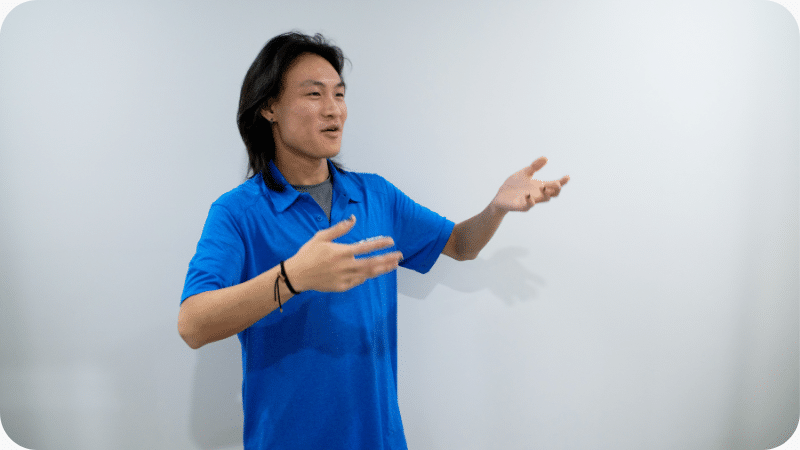
Ways to make public speaking fun for kids!
One of the best ways to make public speaking fun for kids is to get them involved in interactive activities and speaking games.
By switching the focus from debating and public speaking to something more enjoyable, kids spend less time concentrating on something they find daunting and instead place their attention on the task at hand. This allows students to develop their communication skills without realising they’re doing so, leading them to become better public speakers in the process!
At Speaking Schools Australasia, we’ve got an extensive set of resources that our coaches use to help students find their voice, but here are some ideas that you can use at home with your child:
- Have them act out a scene from their favourite book or movie.
- Get them to teach you something they’re passionate about.
- Do a “question and answer” session, where your child has to answer questions from you on a given topic – you can mix it up and get them to think more critically by getting them to ask you questions too!
- Acquire board games such as “Articulate” that help kids develop their communication skills.
- Encourage them to perform impromptu speeches – this will help them think on their feet and be less nervous when it comes to formal speeches.
If you’re looking for more ideas, our YouTube channel is packed with videos on fun public speaking activities for kids!
We hope this has given you some insight into why public speaking is important for kids and how you can help them develop their skills – remember, the key is to make it fun!
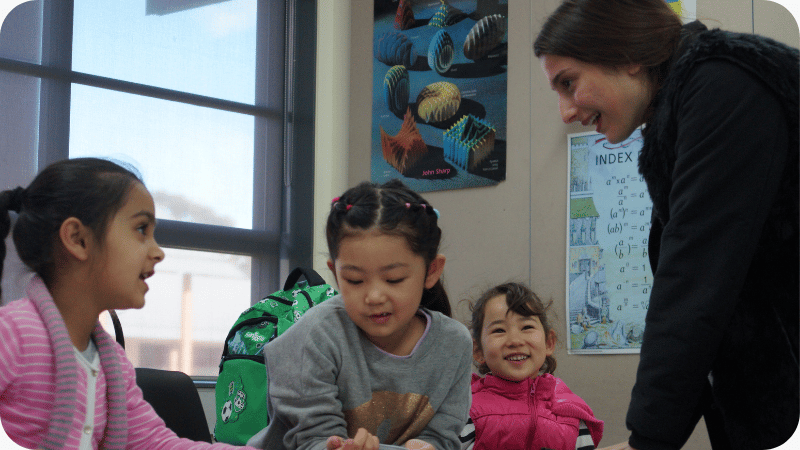
Why choose Speaking Schools Australasia to help develop your child’s communication skills?
There are dozens of reasons why you should choose SSA to help bring out the best in your child – just a few include:
- We are the leading provider of public speaking courses for kids in Sydney, with combined decades worth of experience teaching students of all ages.
- Our classes are smaller in size than other providers, with our largest classes having a coach-to-student ratio of 9:1 (most providers have classes of 12 – 16 students).
- We are loved by Sydney parents and students alike, with 100+ five-star reviews on Google.
- We place a strong emphasis on fun games and engaging content to ensure that students aren’t just attending another coaching session – they’re genuinely excited to attend.
- Our focus is on “learning by doing“, where students can practice their speaking skills at least once every session.
- We are a registered provider in the NSW Government Creative Kids program, with Creative Kids Vouchers accepted for all our programs.
- We have a great team of experienced coaches who understand public speaking and debating, and are passionate about not only teaching children, but helping kids reach their potential.
- Our school holiday workshops and weekly programs are taught at locations all over Sydney.
- We have been running online programs for 5+ years and have a tried and tested formula that helps bring out the best in students;
- We offer a money-back satisfaction guarantee – if you or your child is not happy with our program, we’ll refund your fees in full.
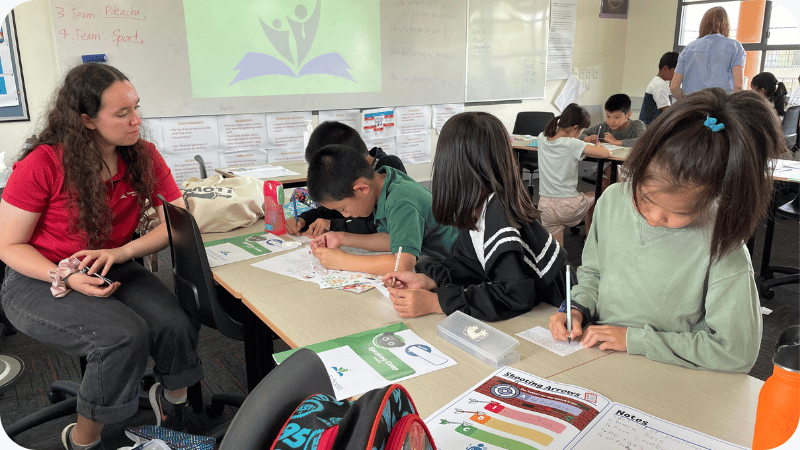
What Presentation Skills Programs does Speaking Schools Australasia offer?
Speaking Schools Australasia offers an incredibly wide range of programs that run in both the school holidays and the school term. Our weekly classes and school holiday workshops run in-person at a wide range of locations across Sydney. Online classes are available for students who either can’t physically attend or prefer the online medium.
In particular, Speaking Schools offers:
- Speaking Skills classes, such as Speaking Skills Butterflies and Speaking Skills Joeys, are shorter programs designed to help younger students learn essential communication skills.
- Presentation Skills classes, such as Presentation Skills Leopards and Presentation Skills Tigers, aim to help early primary school students build their confidence and develop their public speaking skills.
- Speaking Camp classes, such as Speaking Camp Koalas and Speaking Camp Kangaroos, take mid-primary school students through a range of fun and engaging speaking skills.
- Public Speaking classes, such as Public Speaking Penguins and Foundations of Public Speaking, focus on giving students the tools they need to assist their academic learning.
- Debating classes, such as Debating Hummingbirds and Practice Debates, emphasise all of the necessary skills to argue a persuasive case.
In addition to the above, we also run in-school programs for primary and high school students, and Creative Kids Vouchers are accepted for all our programs.
Please get in touch to learn more about our public speaking classes for kids in Sydney!
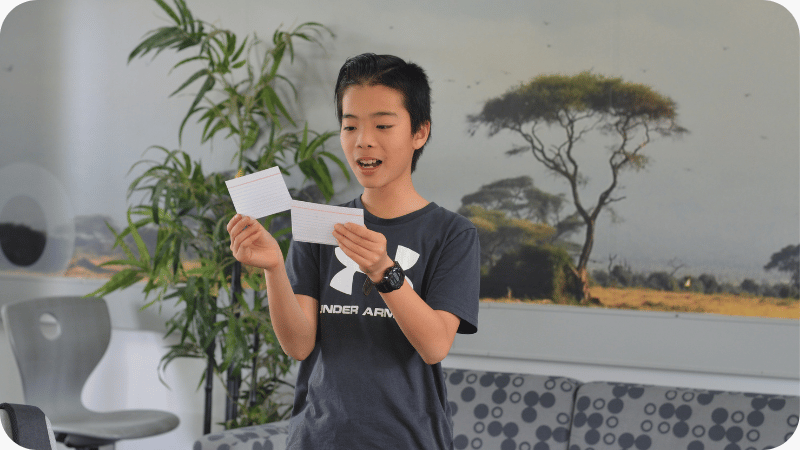
Public Speaking for Kids in Sydney
Overall, public speaking can be a very rewarding experience for both primary school and high school students. It’s a great way to develop confidence, learn new things and have fun!
For parents, the best way to help their kids with public speaking is to encourage them to practice regularly, prepare for upcoming speeches and listen to feedback. And for kids, making public speaking fun can be as simple as getting involved in interactive activities.
If you’re looking to boost your child’s education with the best public speaking classes for kids in Sydney, look no further than Speaking Schools Australasia!
In any public forum – whether it’s a debate team, a classroom, or even the dinner table – you want to be able to stand up for your beliefs and win the argument. But what are the best techniques for achieving this? Luckily, we’ve compiled a list of expert tips for winning every debate. Keep reading to find out how to use these strategies yourself!

Want even more tips for making an incredible speech? Check out our blog to learn more!
1. Do your research
This is perhaps the most important tip of all – if you want to win an argument, you will almost always need to be armed with a good understanding of how the world works.
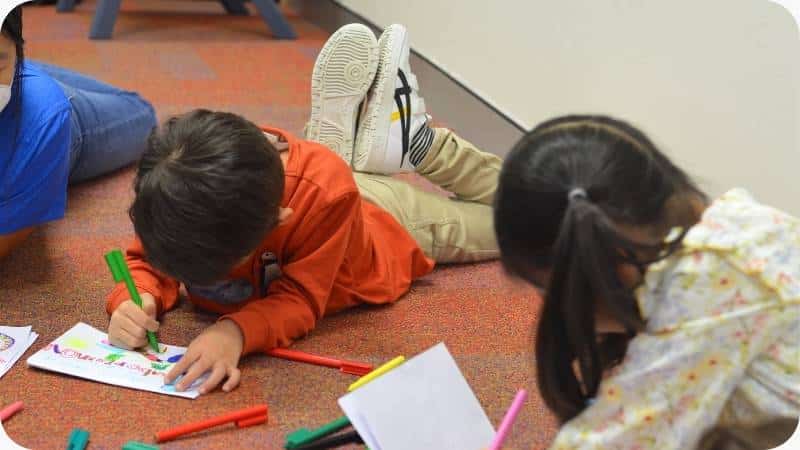
The key to having quality debates is being well read on a range of topics – it’s important to know at least a little bit about a lot of things and to consume your news from a range of sources. But you shouldn’t stop there – read non-fiction, discuss interesting ideas with family and friends, and be ready to have your perspective challenged. It’s all part of the fun!
Some debating competitions will even provide you with a topic area, which will allow you to focus your research on specific areas – this gives you the opportunity to deepen your education on this subject so you’re prepared for anything your opponent might throw at you.

Without a strong understanding of current affairs in society and general knowledge, it can be difficult to come up with arguments that are based on how society actually functions. If you’d like to learn how to strengthen your general knowledge, here’s our longer blog on the subject!
This is not to say that all debate arguments must be empirical in nature: of course, it can be effective to use an emotional appeal to tug on the heartstrings of your adjudicator. However, when debating against a team that has done their research, it is more difficult to win if you’ve got less education on the debate topic than they do.
As a result, debating can be an extremely effective tool for education. If you’re thinking of joining a debating course (or any of the wide variety of courses that are out there for public speaking and debating education), remember that by taking the time to prepare, you’ll be able to debate with confidence.
2. Keep calm and collected
Getting worked up and emotional will only make you look bad and lose credibility. If you can keep a cool head, it will be much easier to argue logically and persuasively.
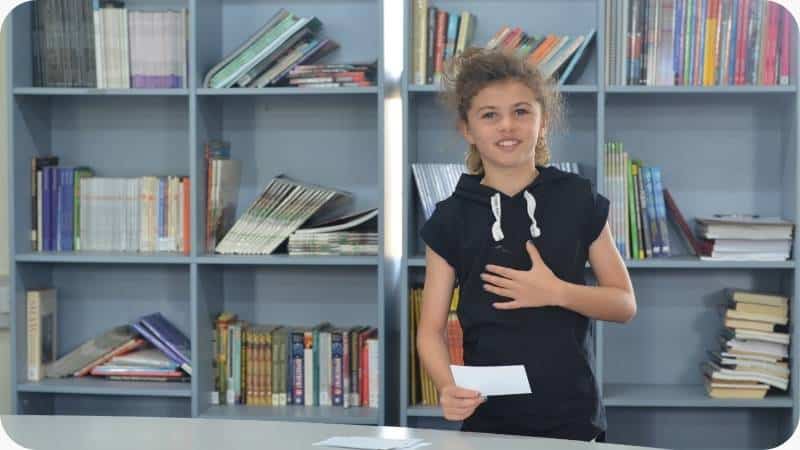
A debate can be a heated exchange, with people on both sides passionately arguing their points. However, in order to debate effectively, it is important to remain calm and collected. When you are calm, you are able to think more clearly and choose your words more carefully. This can help you to make a more convincing argument and persuade others to see your point of view.
Additionally, staying calm also shows that you are confident in your position and helps to build trust with your adjudicator. If you are debating as part of a team, remaining calm can also be important for setting the tone of the debate and keeping your team members focused. Of course, it can be challenging to stay calm in the heat of the moment, but doing so can give you a significant advantage in a debate. Therefore, it is worth taking the time to learn some techniques for remaining calm under pressure.

First, it’s important to remember that debating is about critically thinking about and understanding other points of view. There’s no need to get defensive or take things personally.
Second, try to focus on the issue at hand rather than getting caught up in side arguments. This will help you stay on topic and make your points more clearly.
Third, take a deep breath and relax at the beginning of your speech, and at any time you feel that you’re losing your sense of calm. It can be helpful to visualise calming images or scenes. Debating education courses can help you to build these techniques in real life.
By keeping these tips in mind, you’ll be better prepared to debate effectively and have more fun doing it!
3. Be assertive, not aggressive
There’s a difference between being assertive and being aggressive. The former is necessary in order to win an argument, but the latter will only put people off and make them more likely to side with your opponent.
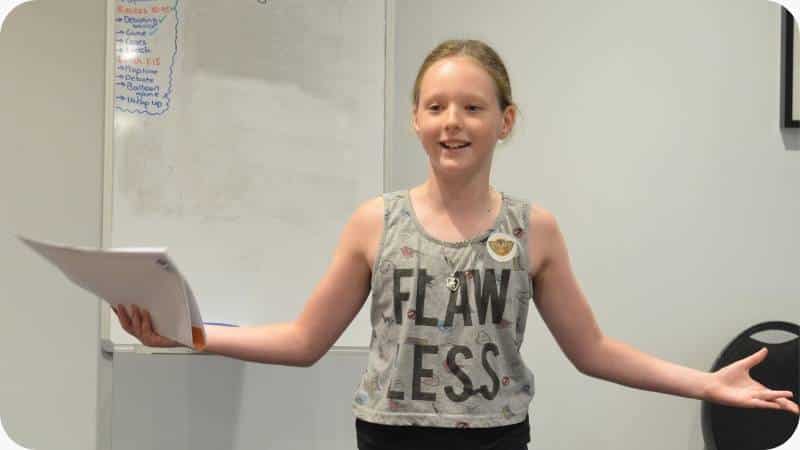
When debate team members take the lectern, they have one goal in mind: to win the debate. In order to do this, they need to be assertive without coming across as aggressive. This can be a difficult balance to strike, but it’s an important one. After all, being too forceful will only put people off and make them more likely to side with your opponent. This is especially true for adjudicators, who are meant to be inherently reasonable. On the other hand, if you’re not assertive enough and fail to persuade anyone of your case, you’re unlikely to win the debate.
Fortunately, there are some things you can do to help ensure that you come across as confident and convincing. For starters, pay attention to your volume. You want to be loud enough so that people can hear you, but shouting will only make you seem angry and unreasonable. Likewise, your pace, posture, and eye contact are all important factors in how you come across. Remember, you’re trying to be persuasive, so it’s important to appear confident and charismatic.

If you’re serious about debating, there are courses and strategies you can learn that will help you debate more effectively. However, it’s also important to keep in mind that unlike arguing at home, debate is about more than just winning arguments. It’s also an opportunity to learn about different points of view and to find common ground. When approached in the right way, debate can be a positive and productive experience for everyone involved.
4. Make sure you’re really listening
Listening is just as important as speaking over the course of a debate.

Just as you need to develop your argumentation and debating abilities, you also need to learn how to listen effectively. Active listening shows that you’re interested in what the other person has to say and it gives you valuable information that you can use to rebut their arguments. When you’re listening, make sure to write down key points so that you can refer back to them later. Another trick is to repeat back what the other person has said in your own words during your speech. This shows that you’re paying attention and it gives you a chance to clarify which specific point you are responding to.
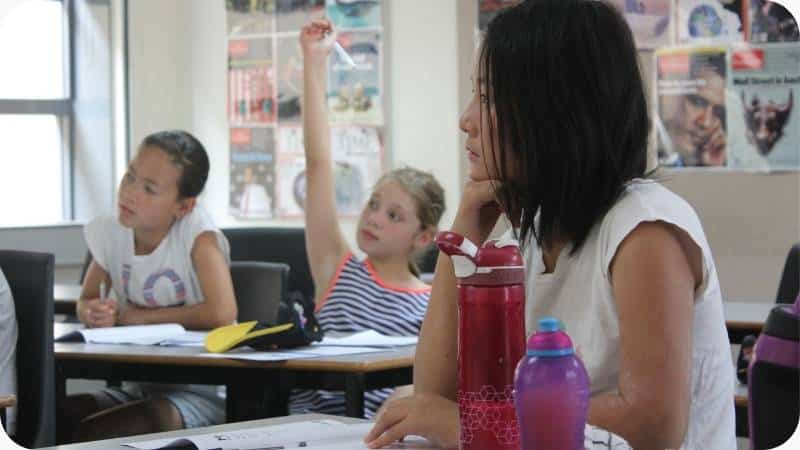
There are many debate courses available that can help you improve your listening and debating skills. However, even if you don’t take a course, you can still use these strategies to improve your listening and debating skills. While a course can provide an amazing opportunity for real feedback from an experienced coach, with practice and the right advice you can become an effective debater and listener.
5. Choose your battles wisely
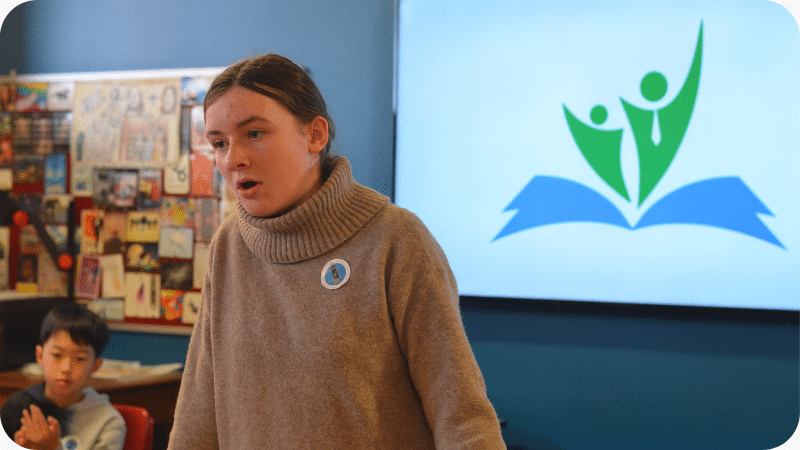
Within the context of a debate, it is not always necessary or beneficial to respond to every idea that is put forward by the opposition. It can be more strategic to focus on key arguments that are more likely to sway the debate in your favour.
This is not to say that every debate should be approached in a purely calculated manner – sometimes, it can be worthwhile to engage in a more emotional debate if you feel passionately about the topic. However, if you know that you are not going to win an argument, or if the claim is based purely on emotion with no factual basis, then it might be better to let it go. Debating is about persuasion and winning over the adjudicator over the course of several speeches, so it is important to focus your energy on arguments that are most likely to achieve this goal. If you are debating as part of a team, this is even more important – you need to craft a debate strategy as a team and make sure that everyone knows what their role is.
There are many debating skills courses available that can help you grow these skills further. Ultimately, it is up to each individual debater to decide which arguments are worth pursuing and which ones are not, based on their own debate style and perspective.
6. Be prepared for rebuttal and counterarguments

Your opponent is likely to have some rebuttals up their sleeve, so you need to be prepared for them.
If your debating team is going up against a particularly strong opponent, it’s important to be prepared for their rebuttals. You’ll need to think about what kinds of arguments they are likely to make and have some solid comeback points ready. If you can anticipate their arguments, you may even be able to prepare a pre-emptive rebuttal.
The best time to do this is near the end of prep, where a third speaker – who has less prepared elements to their speech – can play the ‘devil’s advocate’ role, and come up with a range of arguments the opposition might raise, before detailing how they might want to respond to them. This is a way to stay one step ahead of the other team and give yourself an advantage in all of your debates.
By being prepared for your opponent’s arguments, you can debate more effectively and improve your chances of winning.
7. Use strong language
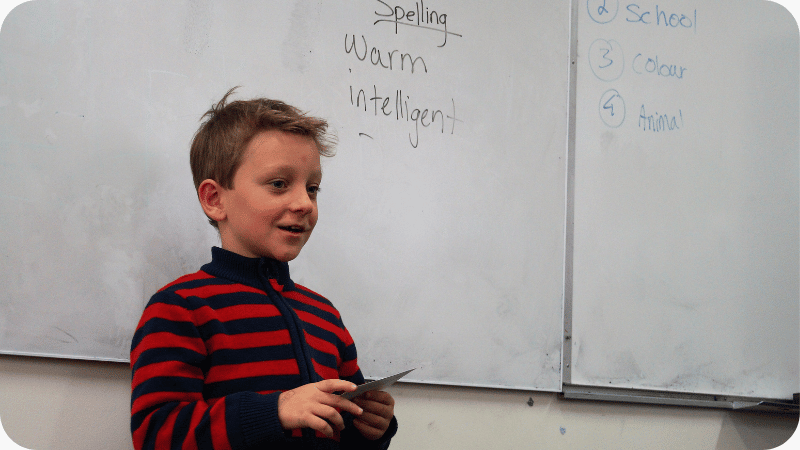
The words you use in an argument can be just as important as the arguments themselves. Choose your words carefully to make sure you’re getting your point across clearly and convincingly.
When you hear a speech or presentation, you’ll notice that some speakers are more persuasive than others. This isn’t always because they have better ideas, but often because they’ve chosen their words more carefully (or delivered them in a more meaningful way). As a result, their ideas are often communicated more clearly and convincingly.
If you want to become more persuasive, it’s important to choose your words carefully. This doesn’t mean using big words or complicated jargon – instead, focus on using language that is easily understood – your audience may not be experts in the particular field you’re discussing, and you don’t want them wasting brainpower thinking about what your words mean rather than thinking about how good your arguments are.
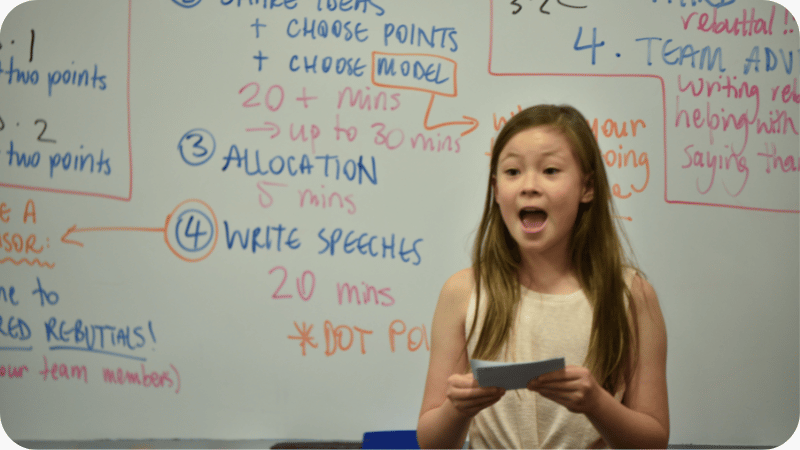
In addition, avoid using filler words such as “um” or “like.” These can make you sound uncertain and less confident in your ideas, as well as serving as a distraction from what you’re actually saying. Instead, take the time to practice your delivery so that you are able to utilise silence in these gaps between your words.
With careful planning and practice, you can learn to use strong language to deliver your ideas persuasively. You can also enrol in a course that can help improve your spoken communication skills. These can be very helpful if you want to learn how to debate more effectively.
8. Avoid using “you” statements
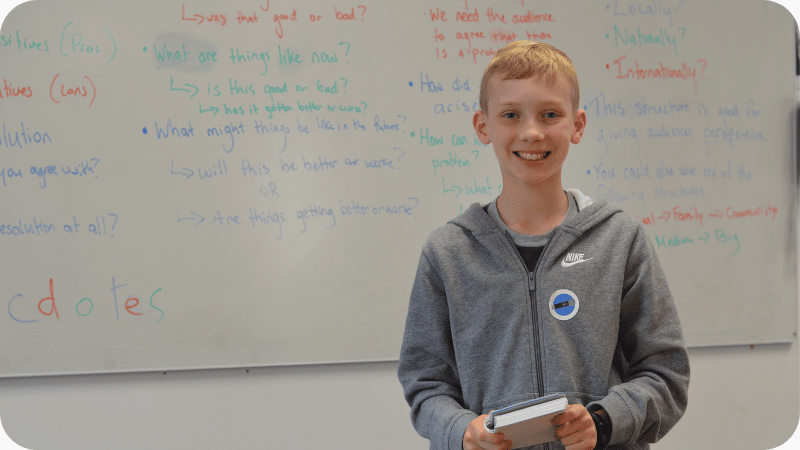
If you’re debating, whether it be with a friend or a colleague, there’s one thing you should always keep in mind: attacking your opponent is only going to make them defensive. It might feel satisfying in the moment to tell them they’re wrong or directly argue with them, but it’s not going to do any good in terms of actually getting the adjudicator to listen to you.
Instead, focus on making your own points in a way that isn’t directed towards your opposition. Remember that the goal is not to persuade your opposition – it’s to persuade your adjudicator and audience. Just as you’re very unlikely to end the debate siding with your opposition’s case, they’re just as unlikely to think your side of the topic is correct. This doesn’t mean you have to avoid all conflict – but it is important to speak in a way that doesn’t target your opposition. After all, the only way we’re ever going to progress is if we’re able to have constructive conversations with those who see things differently than we do.
9. Stick to the point
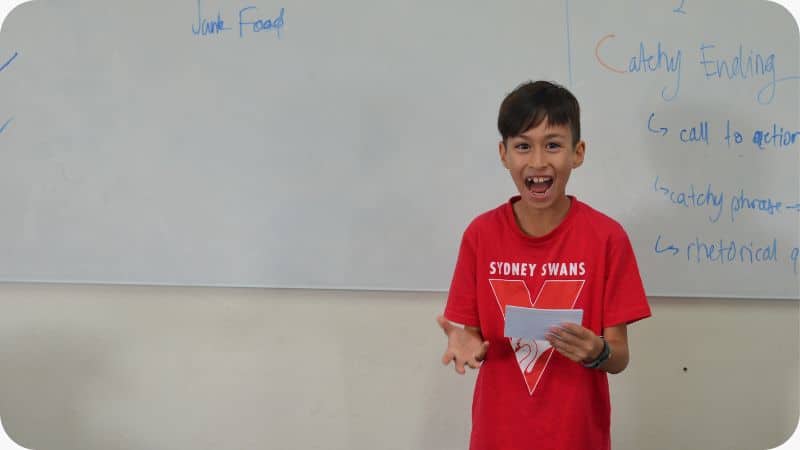
Arguments can quickly become derailed if you start tangenting off into unrelated topics. Stick to the issue at hand and resist the urge to bring up other things.
This can be difficult, especially if you are passionate about your argument. However, going off on tangents will only serve to confuse your audience and weaken your argument.
If you find yourself getting sidetracked, take a deep breath and refocus on the task at hand. You’ll be much more likely to win over the audience if you stick to the point.
10. Have confidence in your argument

If you don’t believe in your own argument, it’s likely that no one else will either. In order to be persuasive, you need to have confidence in your ideas (even if you wouldn’t necessarily agree with them outside of the debate).
This doesn’t mean that you should be arrogant or dismissive of other points of view. Instead, it means that you should believe in the strength of your own argument. If you are passionate about your position, it will be much easier to persuade others to see things your way. Of course, it’s important to back up your argument with evidence and logic. But if you don’t believe in your own ideas, it will be very difficult to convince others to do so.
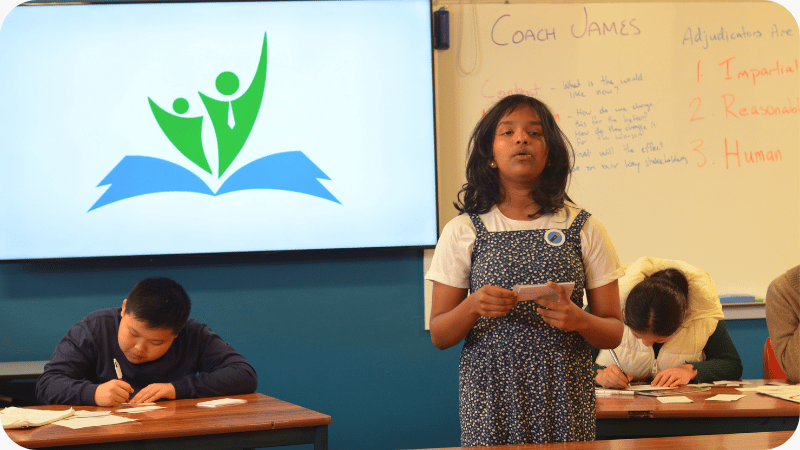
So when you’re preparing for your debates, take the time to really think about why you (or someone else in your position) might believe in your position. What are the strengths of your case? What evidence do you have to support it? Once you’re confident in your own ideas, you’ll be much more likely to persuade others to see things your way.
Over the course of your life, you will need to share your opinions and talk with other speakers whose opinions may land on the opposite side of an issue you care about. While lots of ideas in society are debatable, we hope that these examples of tips and tricks that experts use to win arguments can help you begin to grow your speaking ability.
The next time you’re in a debate, have to give a speech, or are participating in a course, we hope that you will remember these tips and tricks. They can help make you more confident in your arguments, and ensure that you always come out on top.
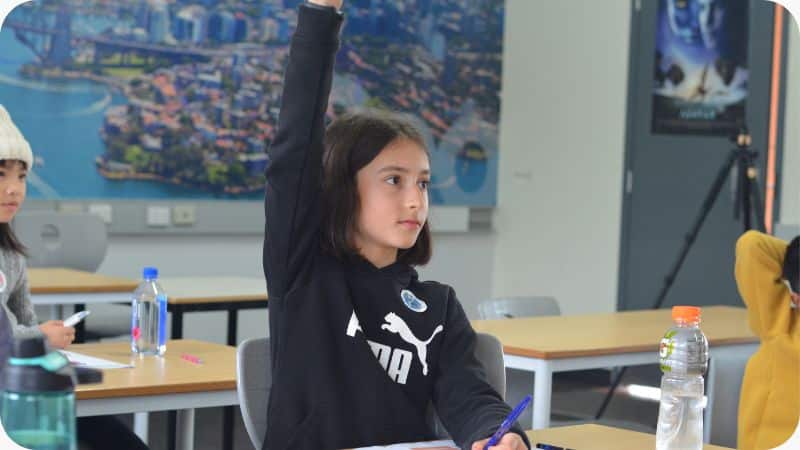
If you want to learn even more about how to win any argument, enrol in one of our debating courses today. Our expert coaches will help you build the skills you need to speak with authority and conviction. With practice, these tips will become second nature – and soon enough, winning every argument will be easy!
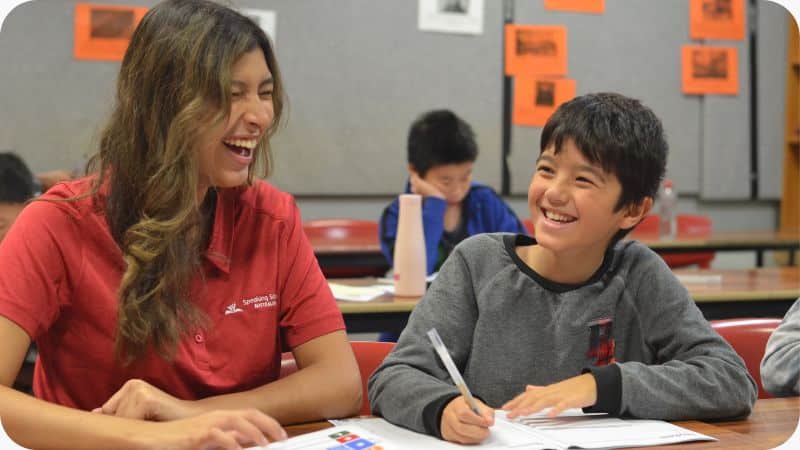
Debating is an essential life skill that helps children develop confidence, learn to think on their feet, and argue their point of view. It also teaches them how to research, structure an argument and articulate their thoughts clearly. While not all children will learn how to debate properly at school, it is actually a very important life skill that can benefit them in many ways.
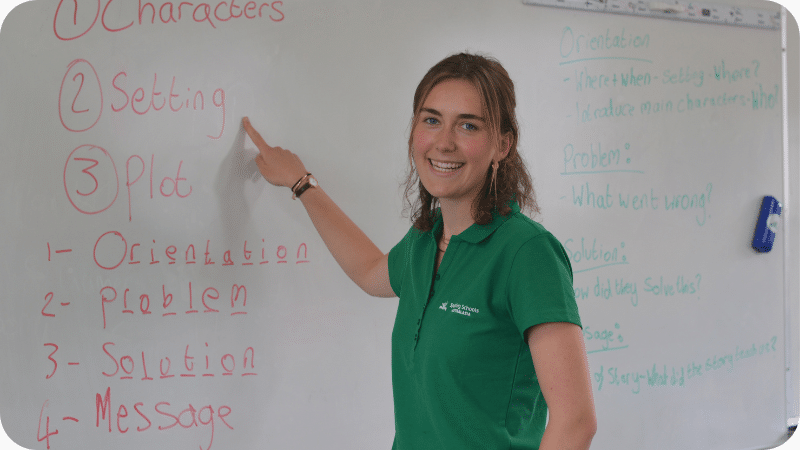
Why is it important for kids to learn to debate?
Debating is an important skill for kids to learn for a number of reasons.
First, it helps kids to think critically and to see both sides of an issue. This is an important life skill that will help them not only in their future studies and careers but also in life more generally – it is crucial to understand concepts from multiple viewpoints to have a balanced perspective of the world (even if you don’t necessarily agree with all those viewpoints).
Secondly, it teaches kids how to communicate effectively. They learn how to articulate their thoughts and arguments clearly and persuasively. This is a valuable skill not only in their education but also in the workplace, as it helps people bring others around to their point of view.
Finally, debating introduces kids to different viewpoints and opinions. They learn about other people’s perspectives and can develop their own opinions on various issues. Debating clubs and public speaking courses are great extra-curricular activities for kids to get involved in to learn these invaluable skills!
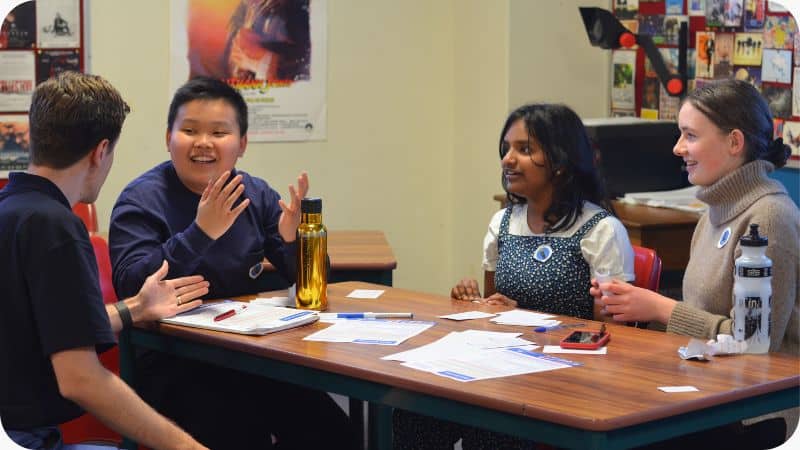
Kids who are debaters tend to make excellent leaders
Debating also helps to build the skills of future leaders. Debaters learn how to think on their feet, how to defend their convictions and how to argue persuasively. These are all essential qualities for any leader. Good leaders need to be able to communicate their vision and inspire others to follow them, making this activity the perfect education for aspiring leaders.
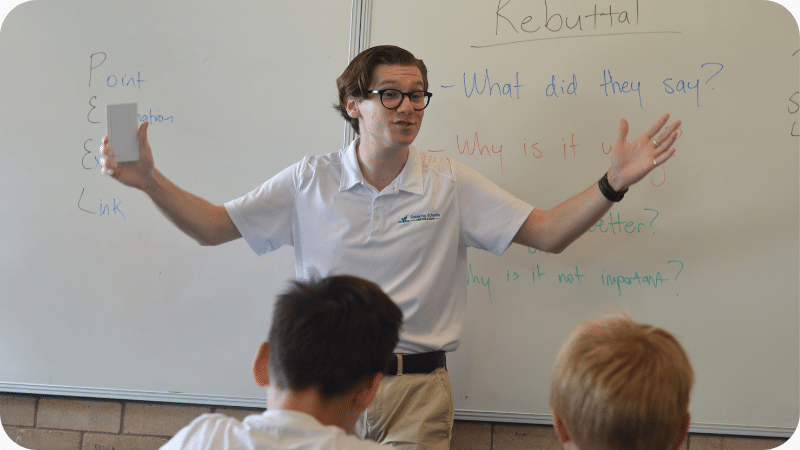
Three steps for debating success
Participating in a debate is an excellent way to hone your argumentative and public speaking skills. In order to be successful, it is important to follow three key steps: preparation, engagement, and feedback.
Preparation is crucial for any debate. You need to carefully craft your arguments and practice your delivery within the strict time limit – often less than an hour in most competitions. This will help you stay calm and confident when engaging with your teammates.
Secondly, engagement is all about actively listening to the other side and thinking on your feet. You need to be able to quickly come up with rebuttals to the other side’s points in order to persuade the adjudicator that your team’s case is comparatively better than theirs. This can be challenging, but it’s also where the fun of the activity comes in – the adrenaline rush of coming up with responses on the fly.
Finally, feedback is essential for improving your arguing skills. After each debate, take some time to reflect on your performance and think about what you could have done better. This feedback can come from anyone – the adjudicator, your teammates, an audience member or even your own personal reflection. By doing this, you will become an even more effective debater in the future – it is definitely true that we can learn from our mistakes!
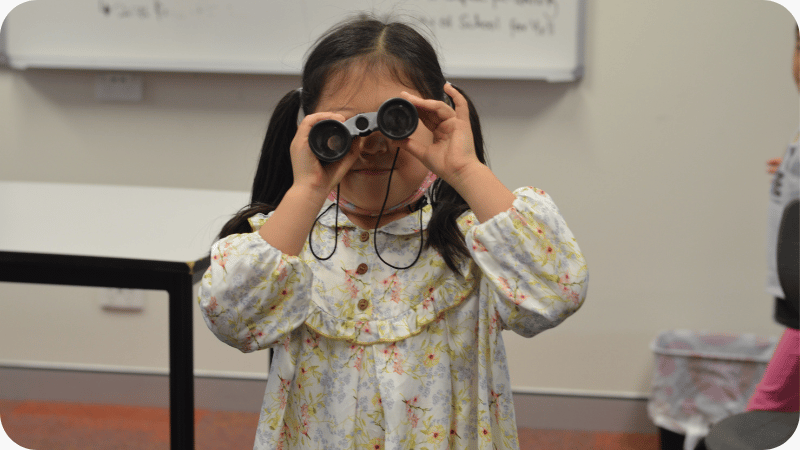
So, how does debating work?
Debating is a great way to learn about the different viewpoints from two sides and hone your ability to argue. But how does it actually work? In most Australian formats, there are two teams of three(and sometimes four) people each: the first speaker, second speaker, third speaker, and sometimes also a silent fourth ‘speaker’.
The affirmative (proposition) team argues in favor of the topic, while the negative (opposition) team argues against it. In the debate, each team takes turns giving their speeches with affirmative starting first until six speeches have been presented (although some competitions also have two extra ‘reply speeches’). The goal is to persuade the judge that if they were to compare your case with that of the other team, it is more likely that your side is on the more preferable side of the debate.

What are the responsibilities of each speaker in the debate?
The first speakers on each team have the responsibility of introducing the topic and giving their side’s general stance on it – this might involve a model from the affirmative, and a position from the negative. They also need to present the team’s main arguments and lay out the structure of the debate.
The second speakers on each team are responsible for responding to the other team’s arguments and presenting additional arguments of their own. They also need to rebut any points that the other team brings up, both in terms of attacking the other side’s ideas, and defending their first speaker from any attacks the opposition has raised.
The third speakers have the responsibility of summarising all of the arguments that have been made and giving the team’s final stance on the issue, as well as any final rebuttals. The third speakers are not supposed to introduce any new substantive material – their role is to sum up what has happened and raise any final issues their team has with the other side’s case.
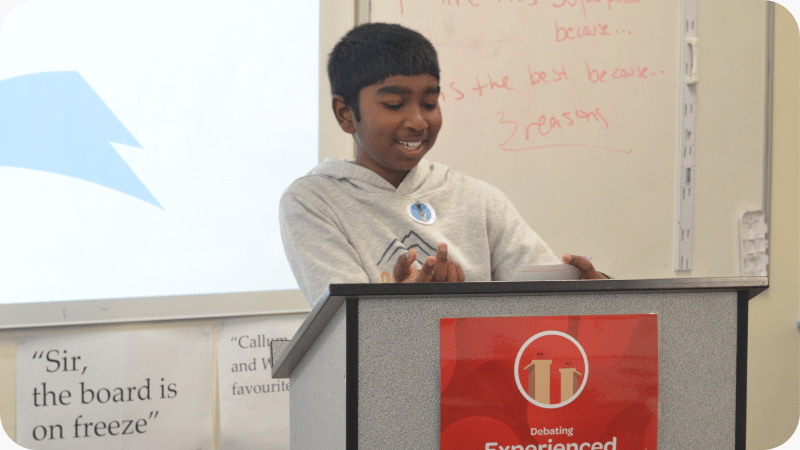
Who is an adjudicator (and what do they do)?
An adjudicator is a person who presides over a debate and decides who the winner is. The adjudicator’s role is to listen to the arguments of both sides, consider the points raised and make a fair and impartial decision.
There are several factors that an adjudicator takes into account when making their decision. These include the quality of the arguments presented, the use of evidence to back up the central claims, and the overall persuasiveness of each side. Importantly, an adjudicator must be reasonable and unbiased – they need to leave their own thoughts and feelings at the door, and judge the debate on its own merits.
In order to make an informed decision, it is important that adjudicators are well-versed in the rules of debating. They must be able to identify logical fallacies and other invalid arguments. Adjudicators must also be able to keep a neutral stance throughout the debate and not let their own personal opinions influence their decision.
The adjudicator’s decision is final and cannot be appealed. The winning team is the side that the adjudicator believes presented the best arguments and reasoning in support of their position.
Adjudicators play an important role in ensuring that debates are fair and unbiased. They provide an essential service in ensuring that only the strongest arguments prevail. Adjudicators help to level the playing field by giving both sides an equal chance to present their case and win the debate.

Audience etiquette during debates
The role of the audience in a debate is to provide support and feedback for the debaters. While not all debates take place in front of an audience, when there is one present there are some important rules to be followed.
First and foremost, the audience should remain respectful at all times. This means refraining from booing, cheering, or otherwise disrupting the flow of the debate.
Another important rule for audiences is to refrain from showing favouritism towards either debater. This means remaining impartial and objective throughout the course of the debate. Audience members should not show any obvious signs of agreement or disagreement with either side of the debate, regardless of their own personal feelings.
By following these rules, the audience can play an important role in ensuring that the debate is fair and productive. Additionally, these rules help to ensure that the debate remains focused on the issues at hand and does not devolve into personal attacks or other distractions.

What is the role of a debating coach and what do they do?
Most people associate coaches with sports, but there are coaches for all sorts of activities – including debating! A debating coach is someone who helps children learn how to debate effectively, much like our coaches at Speaking Schools Australasia.
A good coach will help children understand how to structure an argument, how to research both sides of an issue, and how to deliver their arguments in a clear and convincing way. By teaching children these skills, a debating coach can help them become more confident and competent communicators.
You may see some debating coaches present at competitive debates. The reason that coaches sometimes come to watch debates is so that they can provide feedback to their students to help them improve their debating skills and strategies. The coach’s role is to help the team learn from their mistakes and also to point out what they did well, similar to the role of a coach in one of our debating courses at Speaking Schools Australasia.
Often, either an external coach will be hired by a school to help teach kids debating, or a school teacher will coach the team. Unlike adjudicators, they do not decide who wins the debate, but they do watch their students alk and give them feedback for next time. This feedback is invaluable in their debating education.
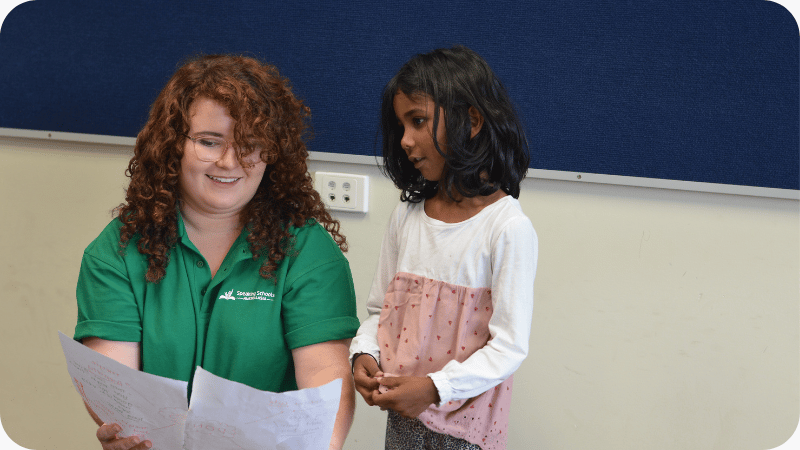
What kind of debating competitions are there in Australia?
Debating is a popular activity in Australia, with many competitions taking place at the primary school, high school, and university levels of education.
Primary school competitions typically involve debating a topic for a few minutes each. Topics can be anything from “That we should ban homework” to “That the city is better than the country”, and usually involve topic areas that the students can directly relate to.
High school competitions are very prevalent in Australia and vary from state to state. The topics tend to be more serious and complex than those debated in primary schools, such as “That Australia should become a republic” or “That employers should be allowed to access the criminal records of job applicants”.
Most people think of debating as something that is only important for people who want to become lawyers or politicians. However, debating is actually a really valuable skill for people of all ages, and it can be especially beneficial for kids.
In particular, it is a useful and important life skill that can help kids become better critical thinkers, communicators, and problem-solvers.

How can we help?
In this blog post, we’ve outlined how debating works and the different roles involved in a debate.
If you’re ready to take your skillset to the next level, why not enrol in one of our debating or public speaking courses today? Our courses cover multiple ability levels for students of all ages from Kindy through to Year 9 (with debating starting from Year 3). There are many ways to get kids involved in debating, such as joining an intensive school holiday workshop or taking part in a weekly after-school program.
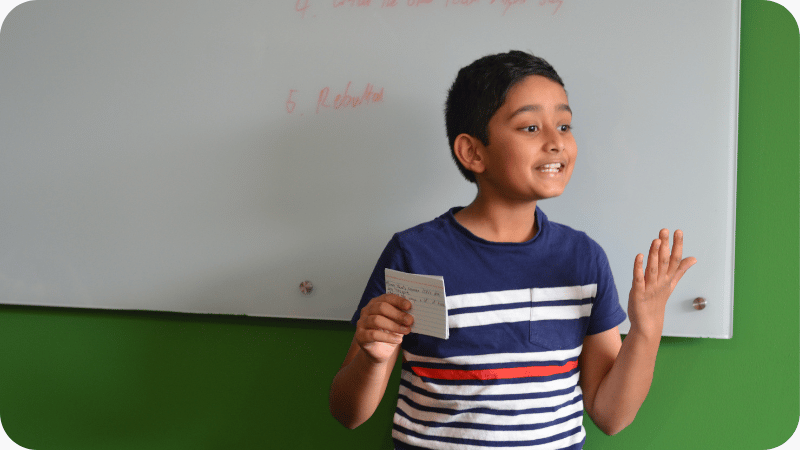
There are also many online resources and courses available to help kids learn the basics of debating. Check out our YouTube channel for our ‘Conquering Debating’ Series which breaks down all of the concepts involved in debating specifically for kids! From how to write a great argument to examples of good speaking manner, we have a video on just about everything. We also have a ‘Speak to Inspire’ playlist that breaks down all the essential skills for students trying to improve their public speaking.
How to find the right course for your child
The course you choose for your child’s debating education will depend on a few different factors, such as their age, debating experience, and what you hope they will get out of the course.
If your child is new to debating, then it might be a good idea to start with one of our beginner courses. These courses are designed to give kids a solid foundation in debating so that they can learn all the basics. Once they have completed a beginner course, they can then move on to one of our more advanced courses.
On the other hand, if your child has some debating experience already, then they might be better suited to one of our intermediate or advanced courses. These courses build on the skills learned in a beginner course and help students hone their debating techniques.
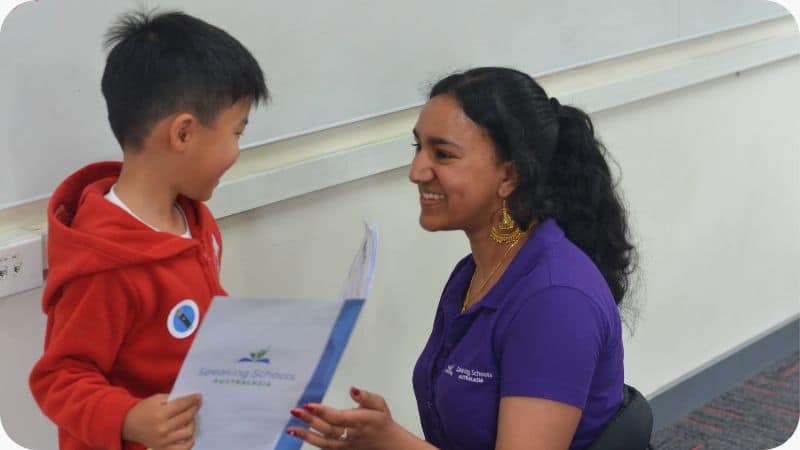
Our courses cover multiple ability levels for students of all ages from Kindy to Year 9. There are many ways to get kids involved in debating. School holiday workshops are a great way for kids to get a taste of debating and see if it’s something they enjoy. These workshops are usually three days long and involve debating a variety of topics.
If you’re looking for a more long-term commitment, then our after-school programs might be a better option. These programs run for 8 – 10 weeks and cover all the basics of debating, from how to construct an argument to how to deliver a speech. By the end of the program, students will have honed their debating skills and will be ready to take on any challenge.
No matter what course you choose, your child will be sure to benefit from the experience. Debating is a great way for kids to learn essential life skills, such as critical thinking, communication, and public speaking. So what are you waiting for? Enrol your child in a debating course today!
When you’re giving a presentation to a group of people, eye contact is key. It can be difficult to make eye contact with a large audience, but it’s important to do your best.
In this blog post, we will discuss some tips for improving your eye contact while public speaking. We’ll also provide some helpful tips for looking comfortable and connected while up on stage.
Follow these tips and you’ll be able to make strong connections with your audience the next time you find yourself public speaking!

Learn your content well
The first step to making eye contact is to learn your content well. This will help you feel more comfortable when speaking and will allow you to make eye contact while still delivering your message. If you know your content well, you’ll be able to make eye contact while still delivering your message.

Focus on one person at a time (but not the same person every time)
It’s important to focus on a few people at a time, rather than looking around the room constantly. This will help you make a connection with each person – trying to focus on one or two different people at a time in each section of the room can be a great way to make sure that you’re getting enough variety!
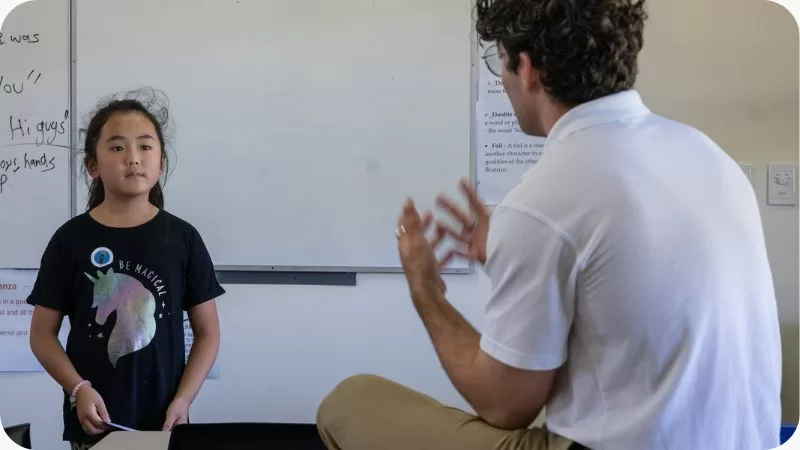
Write your notes clearly
It’s also important to write your notes very neatly and clearly. This way, you can easily glance at them while still making eye contact with your audience. If you’re looking down at your notes constantly and having trouble reading what you’ve written, it will be much more difficult to make eye contact.
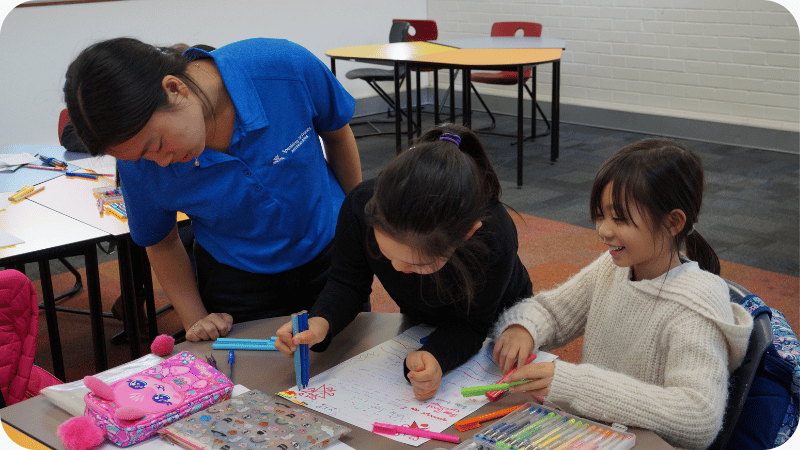
Write less on your notes!
It’s also important to write as few notes as possible! This is because the more you have to reference your notes, the more difficult it becomes to make eye contact. If you have lots of things written on your palm cards, you’ll use them as a crutch and refer to them more regularly than if there are less words on your cards. If you can, you may even want to memories the main ideas (but never word for word – check out the next section!) as this will make it easier to rely on fewer notes!
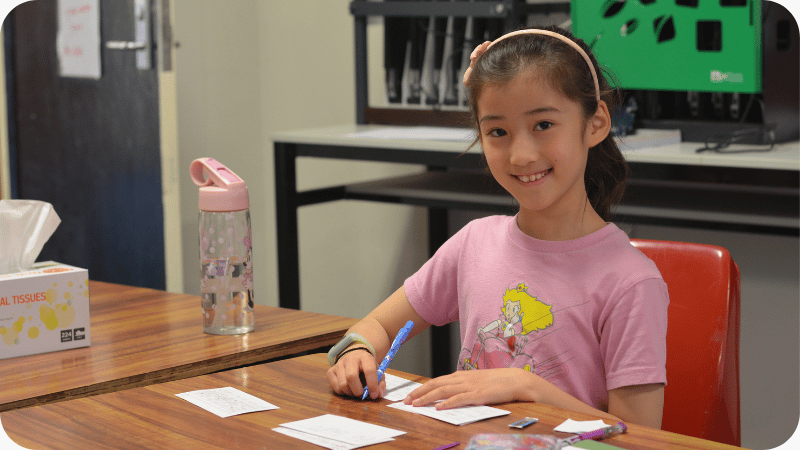
Learn the art of improvisation
Get comfortable with improvisation and elaborating things on the spot. The skill of improvisation helps improve eye contact, because you can be more in the moment rather than thinking about what to say next. It can also come off as more genuine and natural, which makes the talk feel more interesting for the audience. Get comfortable with delivering a sentence in a couple of different ways – the specific words you use matter less than making eye contact and truly getting the point across.

Keep your body language open
Eye contact goes both ways!
When you’re speaking, it’s also important to keep your body language open. Avoid crossing your arms or legs, as this can make you appear closed off. Instead, try to keep your hands at your sides or in front of you. This will help you appear approachable and will encourage people to make eye contact with you.

Keep eye contact to a couple of seconds per person
Whilst it’s a good idea to focus on individuals within the audience, remember that eye contact is about making a connection with everyone in the audience. Don’t stare at someone for too long, as this can make them feel uncomfortable. Instead, maintain eye contact for a few seconds before moving on to someone else.

Find a focal point
This can be a spot on the wall, a person in the audience, or anything that you can focus your eyes on. Once you have a focal point, it will be easier to make eye contact with the rest of the room.
The next step is to practice making eye contact with different people in the room. Try to make eye contact with someone new every few seconds. This will help you get comfortable with making eye contact and also help you connect with more people in the room.

A trick for nervous speakers
If you’re having trouble looking at people in the eye (which is very normal!), another tip is to look at somebody’s forehead rather than their eyes. This can help you avoid eye contact altogether if you’re feeling too nervous, whilst still looking like you’re engaging with your audience – they can’t tell, and you’ll still appear to be making eye contact. Once you get more comfortable, you can gradually start making eye contact with people.

It’s okay to take breaks!
Finally, don’t forget to take breaks! If you’re feeling overwhelmed, take a few seconds to look away from the audience and focus on something else in the room. This will help you to relax and refocus your attention on the public speaking task at hand.

Practice makes perfect in public speaking
When you’re first starting out at public speaking, eye contact can be one of the most difficult things to master. However, with a bit of practice, it will become easier and more natural.
Remember to focus on a few people at a time, write your notes clearly, and keep your body language open. And if you’re feeling nervous, just focus on somebody’s forehead.
With time and practice, eye contact will become second nature!

Deliver your speech with success in mind
Making eye contact is an important part of public speaking, but it can also be one of the most difficult skills to learn. However, by following these tips (as well as some others across our blog), you can enhance your eye contact and make strong connections with your audience, leaving the impression you are a confident and comfortable public speaker during every speech.

Looking for training? Find courses near you!
Do you want to find courses that can help improve eye contact skills for kids learning public speaking? Get high-quality training with individualised feedback at one of our Holiday Workshops or Term Program Courses for kids of all ages from Kindy to Year 9. Our coaches watch for individual habits when it comes to speaking style, and give tips, strategies, and ideas unique to each child to help them improve their performance in every course.
Reduce fear, beat anxiety, and lose nerves by beginning your child’s public speaking journey in a fun and safe environment that can help them to love to talk in front of a crowd. The best speeches come from kids who are having a blast during their presentations.
Visit our locations map to find out where our in-person workshops are being held the coming term or holidays! We hope to see you soon!
By Leah Mercier
It’s no secret that public speaking can be a daunting task for even the most confident of adults. But did you know that regularly presenting speeches can actually help to sharpen a child’s critical thinking skills?
Why build critical thinking?
Critical thinking strategies are important to develop as they help us to analyse and make sense of information, think creatively, and solve problems. All of which are handy skills to have not just in the classroom but in life in general.

So how does public speaking help build these essential critical thinking skills?
When preparing for a presentation, children need to think carefully about what they want to say and how they want to say it. They need to organise their thoughts in a logical way and use evidence and examples to tell a story.
Many kids find courses in public speaking skills can enhance their critical thinking abilities through training them to:
- Solve problems
- Understand new concepts
- Analyse information
- Develop effective communication
- Build confidence
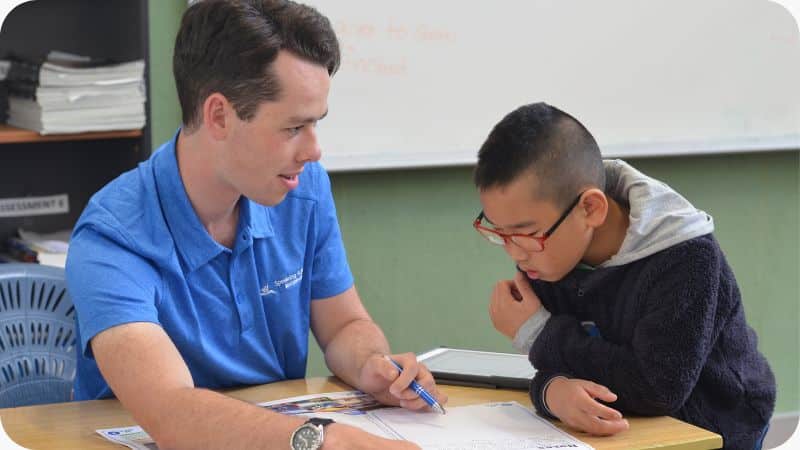
Solving Problems
Learning to speak in front of a crowd helps kids to think critically about problems and to find creative solutions. In public speaking courses, students learn how to analyse a problem and develop a thoughtful and well-reasoned response. This process of solving problems can be applied to other areas of life, both inside and outside of the classroom.
Beginning to think independently
Students need to undergo a self-managed process of planning, writing, and practising their speech.
They also need to work on their individual speaking habits and search for solutions for the parts of the speech they find challenging.
For example, they may find one particular group of words hard to remember, and have to develop a memory trick that will allow them to maintain eye contact during that sentence.
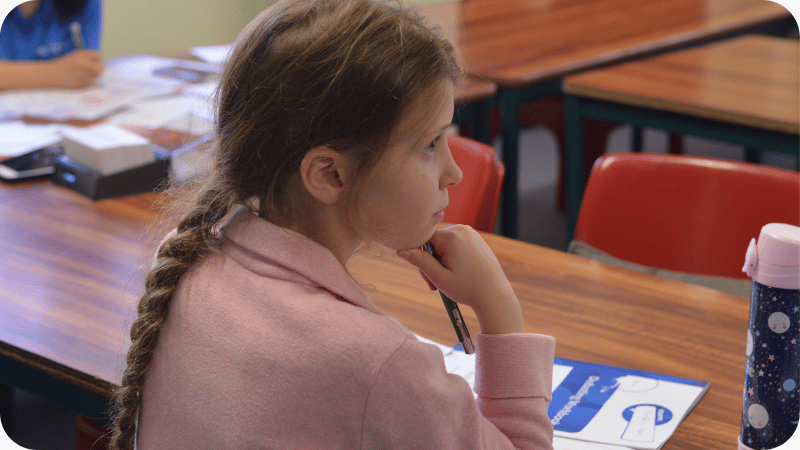
Understanding new concepts
Delivering speeches can be a great way for kids to learn new concepts.
When they are asked to explain a new idea to their classmates, they are forced to really understand it in order to be able to explain it clearly.
This process of critical thinking can help them to better understand the concept themselves.
Sharing with others
Additionally, presentations give kids the opportunity to share their own ideas with others.
This can be a great way for them to get feedback on their thinking and also to learn from their peers.
Ultimately, speech-giving can be a valuable tool for helping kids to understand new concepts.

Analysing information
Creating presentations is a great way for kids to practice analysing information. When you’re breaking down a topic and creating an argument, you have to do a lot of deep thinking in order to figure out what all the different pieces are and how they fit together. This process of analysis can be very beneficial for kids, helping them to focus on and better understand the world around them.
In order to deliver an effective presentation, children need to be able to analyse information and understand different points of view. This process of analysis helps kids to develop their critical thinking skills by breaking down complex ideas into smaller, more manageable pieces.

Sorting information
For example, if your child is researching a topic for a speech, they will need to search for ideas and sort through all of the information they find to determine what is relevant and what isn’t. This skill is not only useful for public speaking but also for other tasks such as writing essays and doing research.

Learning in a stress-free environment
Public speaking courses, in particular, provide an opportunity for kids to practice their problem-solving skills in a safe and supportive environment, which can play a big role in reducing nerves!

Effective communication (talking and listening)
Learning to Talk Clearly
Kids who are involved in public speaking learn how to structure their thoughts and talk clearly and confidently. Kids learn a new approach to creating information in a digestible and convincing manner by understanding the structure of a speech and the theory of how an audience responds to a presentation.

Listening Effectively
Training courses can also teach kids the skills of listening and watching critically while being a part of a crowd. This is an important skill that can help them in school and when they are older and working. It is a skill that will help them to analyze and understand the information they are taking in, and make decisions based on what they have learned.
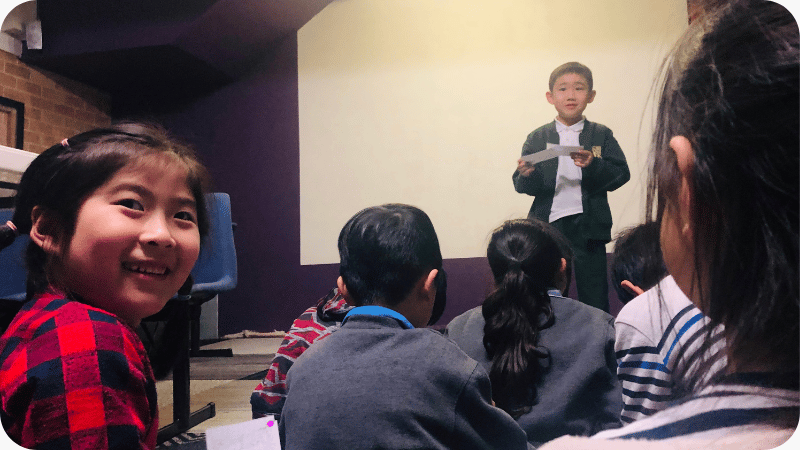
Focus and Memory
In addition, public speaking can help to improve kids’ focus and memory. When preparing for a speech, kids need to remember a lot of information and be able to focus on the task at hand. This can help them in school when they need to remember information for tests and exams.
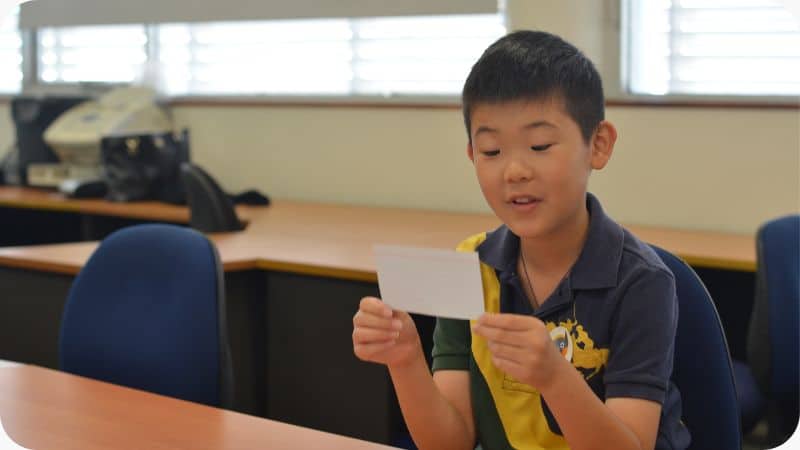
Critical thinking with confidence
The performance of a speech can also help kids to build self-confidence and poise. Participating in public speaking courses gives kids the opportunity to practice presenting their ideas in front of an audience.
Confidence Snowballs!
As they become more comfortable with public speaking, they will also become more confident in their abilities. This newfound confidence can spill over into other areas of their lives, making them more successful in everything they do.

The life-changing skill of critical thinking
Public speaking is a critical skill for any child’s development. It teaches them how to think on their feet, articulate their ideas clearly and concisely, and organize their thoughts. These skills are essential for life and will help your child in any field they choose to pursue. If you want to help your child develop these essential skills, enrol them in one of our public speaking programs today!
Why Learn with Speaking Schools Australasia?
- Receive quality education in a fun and safe environment
- Learn from experienced professionals with intimate class sizes
- Build confidence – our courses are designed to foster a passion for public speaking through an enjoyable experience
- Flexible learning options – attend courses once a week through the school term or for a few days in the school holidays
- Courses suitable for students of all experience levels from Kindergarten to Year 9 and above.
How can I find out more?
If you would like to find out more about our training courses, please visit our website or contact us today. We would be happy to answer any of your questions and help you enrol in the course that is best suited for your child.
For more information, check out the following!
Get started today!
There’s no need to wait! Watch our ‘Speak to Inspire’ videos on YouTube – which we’ve specially created for beginners who want to improve their speaking skills through training online. Our videos cover a whole host of topics such as:
- how to deal with nerves and anxiety to keep calm
- how to give natural eye contact for several seconds
- how to stand with a confident posture
- how to control your tone of voice
Our expert coaches have provided their best tips and tricks to inspire young speakers and help them find success. Join the SSA community by subscribing to our YouTube channel so you can keep up to date with all our online content!
View our ‘Speak to Inspire’ playlist here:
Building the confidence of today’s and tomorrow’s students!
Throughout the history of the world, people have been deprived of a voice – whether it be due to their gender, race, social standing, and oppressive communities.
Although some voices are still being silenced, fortunately, we are now at a time of great change. The modern world is becoming more and more globalised; consequently, we are now blessed with more and more opportunities to express our voice regardless of where we come from. However, are we exploiting these wonderful opportunities? Are our children being given a voice? Are we moving away from the screen and communicating authentically and confidently face-to -face in this modern world?
Building Voices at Home
One of the key pillars to building that voice is to value the younger generations’ opinions, perceptions and thoughts. How do we do this?
We can start small in the family home. Children no longer need to be seen and not heard – we should allow them to express concerns, debate points, and broaden their view of the world. It’s important to actively listen to them – reinforcing the validity of their voice, reassuring them that they are truly being heard, and therefore laying solid foundations for the future.
Speaking out at School
Similarly, schools play a pivotal role in ensuring our young are given a platform to confidently and openly communicate with their peers, teachers and the general community. The classroom can provide a challenging yet nurturing environment to develop the student’s ideas and thought processes, which can then be vocalised. Furthermore, students getting conversing with local community leaders, involving themselves in community projects where human connection is built.
Flourishing in Life
Finally, as students begin taking on jobs, employers play a significant role in helping shape our children’s voices. Consider how much of a voice is needed to participate in meetings, encourage negotiations between employers and employees, cooperate with co-workers and colleagues, communicate with customers – the list is endless!
In a nutshell, the voice of our younger generation and future generations to come is everyone’s responsibility and needs to be truly embraced to help shape more confident, cooperative and resilient leaders of tomorrow!
Being a kid is getting harder.
Think back just a decade ago. Facebook was a fledgling service (Snapchat and Instagram didn’t even exist), students felt less stressed about exams, no one really knew what the word ‘pandemic’ could entail and people were confident that the world would still need lawyers when someone finished high school.
How the world has changed. Social media pervades every area of modern life, academic stress is at all-time highs, we’re all extremely aware of the impacts of a real pandemic and around 40% of existing jobs are likely to be automated by 2030. And things are only set to become harder for our kids.
What can parents do to ensure the best possible future for their children?
The Four C’s for 21st Century Education
As the world becomes more automated, traditional service skills like reviewing documents, accounting and even computer coding will increasingly become the domain of algorithms.
It is therefore important that people, and in particular children, learn the important skills that will set them apart from increasingly clever computers. First proposed by the National Education Association in the US, the Four C’s for 21st Century Education represent the four most important skills students should walk away with after their formative years to ensure resilience in an everchanging world.
Those skills are:
- Critical thinking, which refers to using logic and reasoning to solve problems and make decisions;
- Creativity, which requires children to be able to think outside of the box;
- Collaboration, which involves working with others to reach common goals; and
- Communication, which relates to how students are able to express themselves (and listen) to other people.
Increasing Intergenerational Resilience
There are a number of ways that parents can help make their children more resilient to the uncertainties of the future.
First, parents can make sure they invest in their child’s education. This doesn’t just mean financially – it is important to invest time as well. Making an effort and taking an interest makes students better collaborators and communicators – just make sure to show them how to use the fishing rod rather than handing them the fish. This ensures they develop critical thinking skills as well.
Second, parents can challenge their children. Not in an aggressive or oppositional way – this can be quite harmful to their confidence. Instead, you should challenge them to back up their opinions, and help them develop into the type of person who can craft a persuasive argument. This can help develop their critical thinking, creativity and communication skills, and can be done anywhere from the classroom to the dinner table.
Third, you should encourage them to take part in activities that will help bolster these skills. Things like public speaking, and especially debating, are excellent for helping students develop all of these skills – students have to be collaborative when developing a team case, creative when devising arguments, logical when preparing what they’re going to say and persuasive in their delivery.
Whilst we may not be able to predict what the future holds, there are a few certainties – the world is going to change, employment is going to change, and traditional knowledge is not going to be enough to keep up. Helping our kids think critically, think creatively, collaborate with one another and communicate effectively is definitely a step in the right direction.
How we can help
Public speaking and debating encourage students to communicate their ideas in a persuasive manner, think critically about the world, and collaborate with others to develop creative points. Take a peek at our programs to see how our weekly term programs and intensive holiday programs can help improve your child’s resilience.
Getting involved in debating at school is a scary but exciting step toward becoming a debater. Being a debater can be a huge advantage in life, helping you to boost your confidence and critical thinking skills, learn teamwork and improve your public speaking skills. At some schools, there is a very well-established debating program to become a part of. In other schools, debating may only take place at certain times of the year, or maybe not at all! Regardless of the type of school that you attend, there are many ways that you can get involved in debating and public speaking.
How to get involved in a well-established debating program
If your school is a big debating school, your number one priority may be trying to get involved in the debating team. While there are usually many students who are interested in being a part of the team, often there are only four or five spaces available! If you’re interested in having one of those spaces, the first thing you should do is ask about when your school holds their debating trials. Mark this date on your calendar!
Prepare for debating team trials
The second thing that you need to do is prepare for the debating trials.
In the same way that many people practice soccer or netball at home before the school team is selected, you can do the same for debating! Luckily, debating is a very easy activity to practice at home by yourself if you know the right tips. For example, you can access a large variety of online resources about improving your debating skills. Visit our Youtube channel to check out our “Conquering Debating” Video series, where our expert coaches break down many important debating concepts.
Additionally, you can also take up beginner-level debating programs, which are offered through Speaking Schools Australasia – try giving our Debating Wallabies, Debating Hummingbirds, Debating Parrots, Debating Club or Foundations of Debating programs a try!
Have confidence while public speaking
Once you have prepared, the next step is to show up at trials and be confident. Trials can seem like a scary situation, but our top tip to students who are worried about debating trials is to not worry so much and just give it a go! Participating in the trials is in itself a great way to have some experience in debating, even if you don’t end up being a part of the team. Also, if you have shown active interest in debating by trialling, it’s highly likely that you can get involved in some other way as an audience member, chairperson or timekeeper.
In order to maximise your chances on the day, you should show up on time and try to feel as confident as possible. Our favourite tip for being confident is to take a nice deep clarifying breath, and trust that the people in the room are there to listen to you! You can also check out our blogs on Stage Fright and Glossophobia (the fear of public speaking) and how to overcome them.
Practice debating in the meantime
It might take a while to find out whether you make the debating team at school, but there are other ways to get involved in debating in the meantime. For example, you could join an external debating class where you are guaranteed to get involved in debates, even if you don’t get chosen for your school’s team. In the Speaking Schools Australasia Term Programs, you can get involved and do a practice debate every one to two weeks, depending on your experience level! This is sometimes even more debates than you would do at school in a term as a member of the team!
Getting involved if debating isn’t big at your school
If your school doesn’t have debating trials, how can you get involved? A lot of schools have competitions that they can be involved in for debating as long as there are some interested students. We recommend talking to your teachers and letting them know you’re keen to give debating a try. See if you can find some friends who want to be on the debating team with you! A great idea is to see if you can have an at-school debate between two teams within your class. For example, you could ask your teacher to hold a debate about what you are currently learning in class or a topical issue in the news.
Any student can get involved in debating. If you have more questions about how to become a debater, feel free to get in touch with us at Speaking Schools Australasia!
By Leah Mercier
Everyone has that little voice in their head, something we often call an inner monologue, narrating our life. Maybe it doesn’t sound like Morgan Freeman, but it is always there – an ever-present commentator who knows our innermost thoughts and feelings.
This can be exceptionally useful – our inner monologue can help us find coherence within our thoughts, bounce ideas without fear of embarrassment and entertain ourselves when our phones run out of battery.
But our inner monologues can also be debilitating. They are generally the primary drivers of our own anxieties, and often tend to question our choices:
What if I fail?
What if people hate my idea?
What if everyone laughs at me?
It is up to us to answer these types of ‘what if’ questions. If we take a negative approach – believe that failure is the end, that everyone will hate the idea and laugh at the concept of you speaking up – then we have already lost. What is the point of trying when things look so pessimistic? We make excuses, and put in less effort – at least then we’ll be able to absolve ourselves of blame if (and in our minds when) things don’t pan out.
Thankfully, many people don’t think this way. When asked such questions – by either their inner monologue or other people – many answer positively, and present an optimistic view of the world. ‘Maybe I will fail, but that’s okay, I’ll just give it another shot’. Or ‘maybe people will hate the idea and have a good laugh, but that doesn’t matter, I believe in it’.
This perspective is what confidence looks like. An unshakeable belief in one’s own abilities, and the knowledge that whatever happens we will still succeed. It’s an optimistic take that we can handle whatever the world throws at us.
Confident people are generally less anxious about their place in the world, show much greater motivation to succeed and more resilience when things go wrong, and often have stronger relationships. They also aren’t necessary extroverted – plenty of people are quietly self-assured of their capabilities without outwardly expressing it to the world at large.
But what makes a confident person? It is widely accepted in modern psychology that whilst confidence is partially innate, at least half (and likely more) of an individual’s confidence is the result of how they are raised. No one is truly born confident – although some are more likely to grow up self-assured than others, there is plenty we can do to push the process along.
We’ve pulled together a few easy steps parents can take to help their children develop into more confident adults – check out our blogs on encouragement and failure to learn more!
How we can help
Taming our inner monologues can be hard, but we know which tools work – check out our programs to learn more about how our public speaking and debating programs can help kids change the narrative and build self-confidence.
Public speaking can feel scary.
It has been estimated that up to 75% of all people have some level of anxiety around presenting to audiences, with plenty of people listing public speaking as their top fear. This is particularly true for those of us who feel we were born without innate public speaking skills.
But things don’t have to be this way. We’ve compiled a few tips and strategies for public speaking best practices that can really help with those nerves, and help you put together a great presentation for your next speech contest.
Check out the below to learn more key points for writing a speech for kids!
Tip #1 – Pick your passion
People often get to choose what they talk about in a speech, even if it means reframing a topic to fit what they want it to be. If you choose to speak about something you really care about – whether it be video games, climate change or unicorns – you’re much more likely to actually want to talk about it.
Not only will this help the process feel less daunting, but the added enthusiasm will likely improve your speaking manner – we all get more animated when we’re feeling passionate.
Looking for more public speaking ideas? Check out our blogs on picking the perfect topic and 101 incredible speech topics to see how to use your passion to make your speech even more engaging!
Tip #2 – Know your audience
Public speaking, at its core, is just a strange type of conversation between a speaker and their audience. Who will be there, and what do they expect from you? Are you speaking to your peers or a larger group? Is it a formal presentation, or would conversational words go down better?
If you know your audience – who is likely to be in it (whether it be all the teachers and students at your school or just your dear parents) or at least the type of person who is likely to be present – this will reduce any surprise you feel when you get onto stage, and likely help reduce your stress.
As an added benefit, knowing how to grab your audience’s attention will also help you prepare a speech better tailored to the circumstances, helping persuade them of your point of view!
Tip #3 – Practice makes perfect
Boring, we know.
But practice is what makes a good speech great. When we prepare a speech, we usually spend most of the time thinking about the actual words we’re going to say – but this often isn’t what audiences are really interested in. They actually pay much more attention to the way that we present ourselves, such as our tone of voice and body language – something we can only develop if we practice beforehand, and something that is often missed when teaching presentation skills to kids.
You also don’t need to complete your entire speech first – practice can be iterative, where you practice some elements of your speech to get a better feel of how they flow before moving on to your next point.
Besides, practice helps us feel more familiar with the content, helping reduce the nerves when we actually get up onto the stage – keep this in mind when you’re helping your child write their next speech!
Tip #4 – Visualise the room
Anxiety is the fearful apprehension about something we believe will come to pass – the body’s natural response when we stress about the future.
One of the best ways to overcome anxiety, particularly around public speaking, is to really think about what the future will likely hold – we’ve all seen dozens (if not hundreds) of speeches, and likely given a fair few ourselves.
Most (if not all) of these presentations tend to go pretty well. The speaker gets up, gives their two cents, and then sits down to some level of applause, sometimes rapturous but often just supportive. This is the most likely scenario we all face when we get up to present.
But what if I mess it up, and everyone laughs at me?
In over ten years of public speaking coaching, our Managing Director (Mark) has never actually seen this happen. Audiences know what it feels like to stand up and present, and feel empathy toward a speaker who isn’t doing their best. Rather than laugh at the speaker, most people actually want to run up, give them a hug and remind them everything is alright (and we’ve actually seen smaller children literally do this in our classes).
Audiences are almost always on the speaker’s side, and visualising this – what is likely to happen, rather than what we fear might – can really help ease the nerves in the lead-up to a big speech.
Make sure to keep this in mind when you’re next assisting with the preparation of your child’s speech!
Tip #5 – Redirect your Stress
Unfortunately, whilst we can limit our anxiety around public speaking, it often never truly goes away. Whilst many might consider this a disadvantage, it really isn’t.
A little bit of stress can actually be a good thing. It is a great motivator, helps us focus, and gives us an enthusiasm we might not otherwise possess – all of which can lead to a much more engaging speech. Whilst too much adrenaline can be bad for our health, a little bit here and there can really help us succeed.
All of this is great for public speaking. Redirecting our nervous energy into our speech can motivate us to actually get up and speak (this is a ‘fight’ rather than a ‘flight’ response), help us keep on point, and assist us in giving a more passionate presentation.
Tip #6 – Use your breath
If meditation has taught us anything, it’s that nothing calms the nerves like a few deep breaths.
Make sure you breathe calmly while you’re waiting to give your speech, especially if you feel any level of panic coming on. Breathing helps calm the nervous system, and in many circumstances, can actually postpone panic until you’re back in your seat.
But don’t let the good breathing stop there. When you’re up on stage, about to start, it’s a good idea to take one deep breath before you start speaking – this will help you focus, and give you the strong start that you need (you can also learn more tips for starting a speech here). Then continue taking deep breaths as you go through, particularly if the nerves aren’t going away – this can help keep the anxiety at bay.
In many ways, our breath is the best tool in our arsenal to help keep us calm, and is something with can use to help with our presentation skills from a young age.
Tip #7 – Take on feedback
Our last tip is to listen carefully to any feedback you receive, and make sure you put it into practice when you next present. Feedback, and in particular constructive criticism, outlines our mistakes, and gives us avenues we can take to overcome them in the future.
This is how we learn, and feel more comfortable when we next get up to present.
How can we help?
Whilst schools teach public speaking in some instances, we’ve been coaching public speaking and debating for almost a decade.
We know how to put all of these public speaking techniques (as well as many others) into practice to help boost your child’s confidence.
Learning the dos and don’ts of public speaking from an early age can help teach kids communication skills and leadership skills that they will take with them through life.
Have a look at our courses to find out more about how our holiday and weekly term programs might benefit your child.